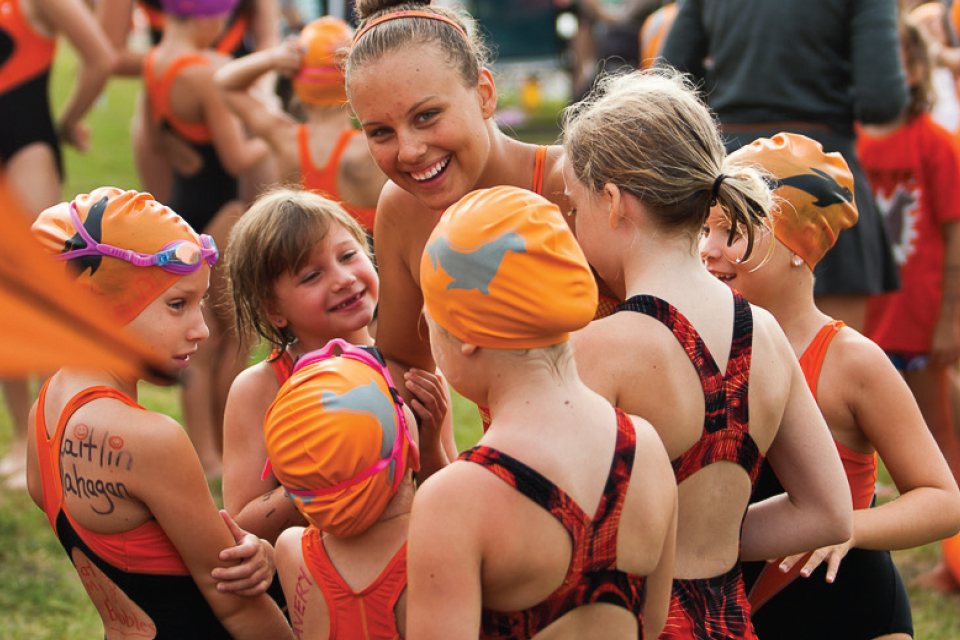How to Make the Most of Your Summer League Swimming Experience

It’s that time of year again, when the pool becomes your second home during the next 8 to 10 intense weeks. Can you smell chlorine and sunscreen yet?
Summer league swimming is a unique experience; there is no better way to introduce your kids to swimming as a sport and a life skill. After one season, they may develop a love for the sport that brings you poolside day-in, day-out for many years to come, or they may simply be left with a level of confidence and skill in the water that stands them in good stead for the rest of their lives. Either way, your kids will have fond memories and a new level of self-confidence, in and out of the pool. So how can you help your kids get the most out of their summer league experience?
Fun vs. Play
Most summer league programs teach fundamental swimming skills in a fun and relaxed environment so that kids enjoy swimming and want to come back. It’s difficult to actually teach kids at the end of a long school day, when they’re in a swimming pool with a bunch of their friends. Parents can help kids understand the difference between fun and play. You can have fun while learning and mastering new skills—after all, it is fun to be good and get better at something—but you can’t learn if practice is a time to play and goof around. Most teams have time dedicated to play (think Friday Fun-day), so remind your kids to play when they are meant to, but to find fun in listening, concentrating, and improving as swimmers.
Winning vs. Improvement
It’s an ingrained human trait to want to win. For many kids, summer league is their first introduction to “racing,” so this is the perfect time to talk about what is really important in sport and life. It takes age and perspective to truly appreciate that winning is not what counts; summer swimming is a perfect opportunity to plant the seeds of that concept in children’s minds. Measure their success by appreciating their improvement and commending them not just for their results, but for the way they conducted themselves: with dignity, respect, and dedication. While the winner of each race might get a ribbon, most teams also give ribbons or rewards for personal best times. Measuring yourself against yourself and appreciating your improvement as an achievement is a great life skill. Not coincidentally, those who do this the best end up winning. They put their focus in the right place and strive to be the best they can be.
Positive Encouragement
Kids swim well if they feel confident. Make sure your children know that summer swimming is all about learning and trying new things; keep it light and fun. Stay positive when you talk about your kid’s swimming; use setbacks as learning opportunities, and never frame them as failures (another great life lesson). You can always shift focus by finding the positives.
Swim Meet Nutrition
There is nothing quite like a swim meet. Kids come early to “warm up” and then sit around waiting for their races for hours. Many summer league meets take four to seven hours to complete, and participants might race for six minutes or less in total. In between, they play, read, decorate each other with Sharpies, plug themselves into electronics and, often, eat candy. If possible, keep the candy tucked away until your kids are done swimming. Eating straight sugar provides an energy high followed by
.jpg)
a crash; it won’t satisfy your kid’s hunger or nutritional needs. Good meet snacks include fresh fruit, nuts, trail mix, PB&J sandwiches, cheese and crackers, and kids’ nutrition bars. Try to be aware of other children’s allergies in this environment and pack snacks accordingly. Avoid heavy snacks within 30 minutes of racing. The best time to snack is right after a race when there is a break before the next swim. And I can’t exaggerate the importance of hydration. If kids are eating snacks, they need to drink water and lots of it. Water will help your kids recover faster and feel good despite the heat.
Volunteer, Volunteer, Volunteer
Summer league only happens because swim parents are awesome. It takes an army of parent volunteers to pull off the season and each meet. You might as well embrace it, as every team has minimum volunteer requirements. Look at it as a great way to form new friendships in your community as well as share the activity with your child. There is no doubt that summer league is a serious time commitment, but the season is short. If you and your kids want to get the most out of summer league, live it. Try to clear your family’s plate of other commitments for the weeks of the season to enjoy your summer of swimming.
Jay's Swimming Journey
Overton’s book is a great way to bring up some of the topics mentioned is this article with kids.
Jay’s Swimming Journey is the tale of a young boy who listened to his coach, focused on himself, had fun swimming, and showed great improvement as a result. Aimed at young swimmers but with a message pertinent to athletes of all ages and from all sports, Jay’s Swimming Journey demonstrates the benefit of paying attention to yourself and the details and making the most of every day in practice.






